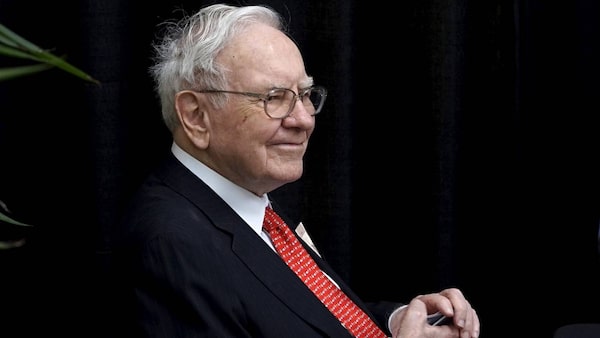
Berkshire Hathaway CEO Warren Buffett
Berkshire Hathaway's recent purchase of Apple shares has revived debate about whether the world's biggest tech company has become a value stock.
After all, Berkshire's Warren Buffett made his fortune seeking out undervalued companies with strong fundamentals and dominant industry positions, and it's not hard to argue that Apple meets those criteria.
Now, the iPhone maker is well on its way to becoming the world's first $1-trillion (U.S.) company. Its shares are up 45 per cent in the past year. Berkshire has about 130 million shares, a $20.2-billion stake. The Street recently figured Berkshire has made almost $3-billion from this investment.
There has been a lot of teeth-gnashing in recent months about tech stocks such as Apple and others leading the market gains: Facebook, Amazon.com, Netflix and Google parent Alphabet have driven the major stock index higher this year, leading some to wonder whether we are in the midst of another tech-fuelled bubble like the one we saw two decades ago.
When that bubble burst, the market plunged into a two-year morass.
But conditions are different now. In the mid-1990s, Alan Greenspan famously warned of "irrational exuberance" in the stock market. Now, he's not worried about stocks – he's worried about bonds. Years of low rates are about to be reversed as central banks begin to raise rates. Lately, he has been warning about a bond bubble.
Investors have scoured for growth anywhere they can, and they have settled on the tech sector as the one reliable place to find it.
But skeptics who still find it hard to believe Apple is a value stock might be interested to learn that it fits perfectly in our model tracking Mr. Buffett's investing style, which I based off the book Buffettology.
For starters, Apple is clearly a company with a durable competitive advantage. Its brand is instantly recognizable and it has a firm command of consumer pocketbooks. Mr. Buffett likes household names, with long-time holdings of Coca-Cola and Wells Fargo and a big stake in Kraft Heinz.
But Apple passes several other Buffett screening measures, which look for predictable profits, reliable growth and a bargain share price.
Even though Apple has had two earnings declines in the past seven years, it still demonstrates predictable earnings, with long-term historical earnings-per-share growth of 12.3 per cent and future EPS growth of 11.3 per cent, based on analyst forecasts.
Apple manages its cash flow well. It could pay its $89.8-billion of debt in two years based on earnings, and it doesn't have to invest heavily. Its free cash flow per share of $7.30 means it generates more cash than it uses. It generates 21-per-cent returns on its retained earnings and it's buying back its shares, reducing its share count to 5.3 million from 6.6 million a few years ago.
Mr. Buffett looks at growth trends. Apple's return on equity for the past 10 years averages 31.5 per cent, never falling below 20 per cent in that time. Its return in the most recent three years is 37.2 per cent. And its return on capital, which is net earnings divided by the money it invests in its business, is 27.8 per cent, far above Mr. Buffett's 12-per-cent hurdle.
Of course, none of this matters to him if the shares are overvalued. The Buffett model examines this question from different vantage points, and from each of them it looks like Apple shares have room to rise.
The model looks at two different methods to calculate future returns. The details behind these calculations are too detailed for this column, but the bottom line is the average of these two methods estimates a 15.6-per-cent annualized return on the stock out into the future.
And Apple isn't the only stock that gets approval by the Buffett model. Below are a few other names that have durable competitive advantages and have the fundamentals that make them attractive through the lens of the quantitative Buffett approach.
Automatic Data Processing Inc. (ADP), the large-cap payroll and human-resources services firm that hedge-fund investor and activist Bill Ackman recently announced a stake in, has had decent earnings growth over the past 10 years and an impressive 25-per-cent average return on equity over the same time period. Shares trade at a multiple higher than the market but the business fundamentals look solid.
Nike Inc. (NKE) passes nearly all of the criteria in the Buffett screen. The one measure it falls short on is the expected return on the stock, which comes in 9.5 per cent (that's still decent). Nike's worldwide brand name, leading position in the active footwear category and high levels of profitability make this a primo Buffett-like pick. We know Mr. Buffett likes shoes since he already owns footwear maker Brooks.
Priceline Group Inc. (PCLN), the online travel reservation business, wouldn't appear to be your typical Buffett type of holding on the surface, but the fundamentals, including its 10-year earnings growth rate of 13 per cent and average ROE of 28.4 per cent, as well as other characteristics, give the stock a score of 96 per cent, according to the model. Shares, which trade within 15 per cent of their 52-week high, carry an above-market multiple but that is to be expected from a company that has increased both earnings and sales by double digits over the past five years.
John Reese is chief executive officer of Validea.com and Validea Capital, the manager of an actively managed ETF. Globe Investor has a distribution agreement with Validea.ca, a premium Canadian stock screen service.
 John Reese
John Reese